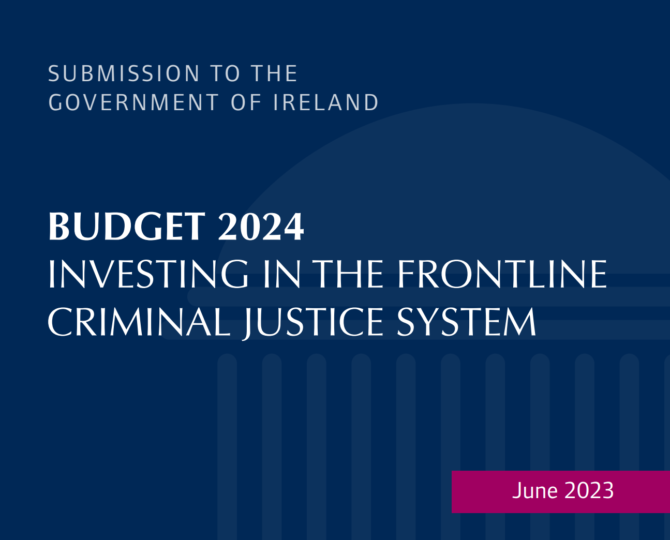
The Government and relevant Ministers have been furnished with The Bar of Ireland’s Pre-Budget Submission, focusing on the restoration of professional fees paid by the State to barristers.
The submission was made following supportive comments made by Minister for Justice Helen McEntee, at a recent engagement.
Storing up a Man Power Crisis.
Minister for Finance, Michael McGrath TD, Minister for Public Expenditure & Reform, Paschal Donohoe TD and Minister for Justice, Helen McEntee TD were all warned in the 2024 Pre-Budget Submission, that the failure to restore professional fees was ‘storing up a man-power crisis’.
A continued exodus of criminal practitioners has created the conditions for a grave and serious man-power crisis in respect of frontline advocacy services and there are a number of serious consequences arising from this developing situation within the criminal bar, the Council said.
Referencing the reducing pool of experienced criminal barristers over time, the Council referenced “recent reports which indicate that this issue has already begun to manifest itself in the DPP having difficulty securing the services of experienced senior counsel to prosecute serious offences against the person in the Central Criminal Court”
Outcome of July 2018 Review Process Remains Unimplemented.
On Thursday, Minister for Justice, Helen McEntee TD, addressed the issue head-on, stating:
I see no good reason why those in the legal profession are left waiting for crisis era reductions to be restored, while public and civil servants have had their pay restored.
It is very much on my agenda for the upcoming budgetary process and my discussions with Minister Donohoe.
Her comments reflect the view expressed in July 2018, in a review conducted between the Office of Director of Public Prosecutions and the Department for Justice, sanctioned by the Department of Public Expenditure & Reform.
That Review concluded:
That all parties are in unequivocal agreement that the ongoing flexibility being delivered by prosecuting counsel, documented above, is considered comparable to the flexibility delivered by other groups to justify the reversing of cuts imposed during the financial emergency.
It should be understood that “ongoing flexibility” refers to cooperation with important improvements in the quality of the administration of criminal justice in the State, including the implementation of the latest developments in Irish and European law, new protections for the rights of victims of crime, additional data protection obligations of the DPP, and the increasingly onerous work associated with ensuring full disclosure of relevant material in an age of rapidly changing technology.
A correspondence in 2021 from the ODPP to the Department of Public Expenditure and Reform also stated their support for the reversal of cuts imposed on barristers.
Ongoing contribution of The Bar to efficiences
The submission provided a number of examples of reforms and changed practices that barristers in the criminal justice system have continued to cooperate with. These include, but are not limited to Review of Disclosure, Preliminary Trial Hearings, Adoption of Paperless Briefs, the 2020 O’Malley Report Reforms (Review of Protections for Vulnerable Witnesses in the Investigation and Prosecution of Sexual Offences).
The overall impact of the cooperation of the Bar with these reforms include:
- Facilitating the expeditious and efficient conduct of proceedings giving rise to the least disruption to the jury, complainants/injured parties witnesses and court staff involved with the trial, and enhancing their experience of this vital public service.
- Assisting the Judiciary and Court Service in case management, list management and overall output.
- Giving rise to significant savings in time and resources of other state bodies including the ODPP, CSSO, Garda Síochána, Probation Services, Prison Services etc.
Unfairness and inequality in State’s Approach
Drawing attention to the restoration approach taken with other professionals delivering services to the State, the submission states that these anomalies demonstrate
…an unfairness in the approach of Government in its pay policy in respect of barristers. All other groups of workers who were subjected to the emergency FEMPI cuts throughout the justice system have since had their cuts reversed and no other group of workers in the State is having to endure a pay level that was in place 21 years ago.
On foot of the above, and the substantive submissions made within the document, The Bar of Ireland asks the Government to:
- immediately restore the link with public sector pay agreements and
- engage in a process to unwind the cuts applied to the professional fees of criminal barristers.
The Bar of Ireland is simply asking that the profession be treated fairly and reasonably, consistent with the approach taken in relation to other groups of workers and independent contractors where the State is the paymaster.